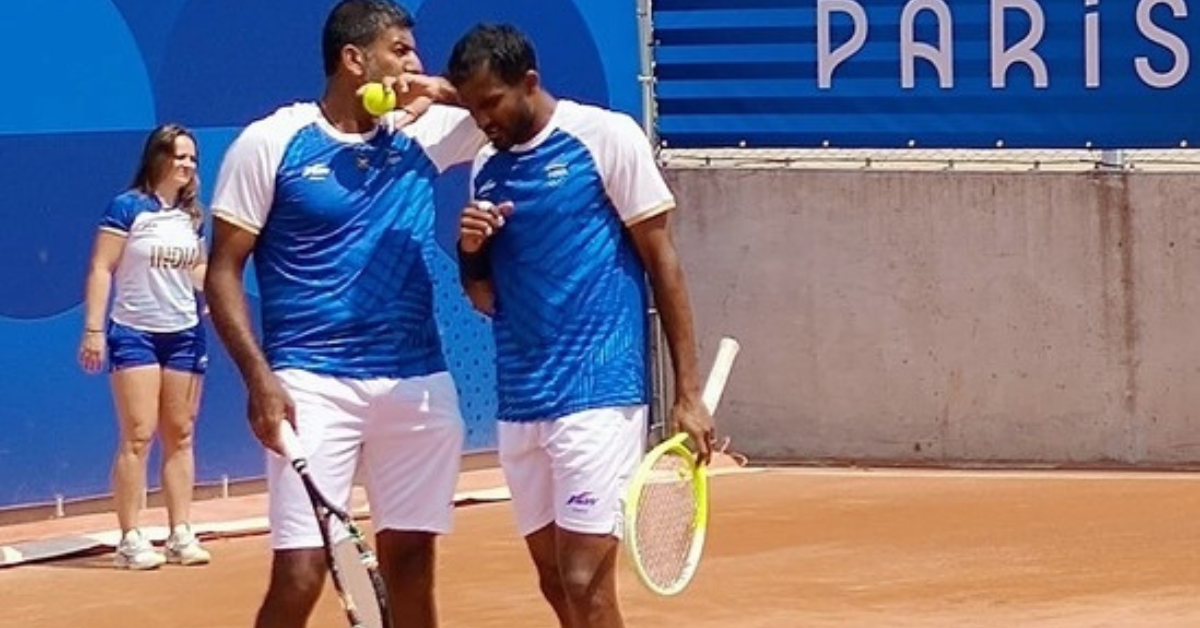India’s tennis campaign at the Paris Olympics 2024 came to a disappointing end after just one day, as Sumit Nagal and the men’s doubles pair of Rohan Bopanna and N Sriram Balaji were ousted in their respective opening matches by French opponents. This marked a significant moment, likely the last time Bopanna represented India in a multi-sport event, highlighting both the highs and lows of Indian tennis on the global stage.
Sumit Nagal’s Battle: A Near Miss
Sumit Nagal, in his second appearance at the Olympic Games, faced a tough opponent in France’s Corentin Moutet. Nagal’s strong baseline game showed promise, but it was not enough to overcome Moutet’s versatile play, resulting in a three-set loss. Despite bouncing back after losing the first set, Nagal ultimately fell 2-6, 6-4, 5-7 in a grueling two hours and 28 minutes match on court seven at Roland Garros.
Nagal’s journey in the Tokyo Games had ended in the second round against Russia’s Daniil Medvedev. In Paris, he had hoped to capitalize on a seemingly manageable opener. The Indian player was up 2-0 in the decider with an early break but allowed Moutet to claw back and win, showcasing the unpredictable nature of tennis.
Nagal vs. Moutet: A Tactical Encounter
The match between Nagal and Moutet was a tactical showdown. Nagal started with a solid baseline game, but Moutet’s unconventional tactics, including underarm serves and effective drop shots, kept Nagal on his toes. The chants of “Coco-Coco, Aaale-Aaale, Moutet-Moutet” from the home crowd certainly fueled Moutet’s energy.
Nagal’s nervy start and a boisterous crowd backing Moutet set the tone for a challenging match. Despite bouncing back in the second set, Nagal’s lack of a plan B and Moutet’s strategic play eventually led to the Indian’s defeat. Moutet’s use of high balls and slices disrupted Nagal’s rhythm, demonstrating the importance of adaptability in high-stakes matches.
Rohan Bopanna and N Sriram Balaji: A Hard-Fought Contest
Later in the day, the men’s doubles pair of Rohan Bopanna and N Sriram Balaji faced Edouard Roger-Vasselin and Gael Monfils. The Indian duo went down fighting 5-7, 2-6. The French team, with Monfils replacing the injured Fabien Reboul at the last minute, had the upper hand with the support of a partisan home crowd and Monfils’ big-hitting prowess.
This match was particularly significant for Bopanna, who has announced his retirement from Davis Cup, marking what was probably his last representation of India in a multi-sport event. The doubles match featured several intense baseline exchanges, with the French strategy of engaging Bopanna in long rallies proving effective.
Key Moments: Bopanna and Balaji’s Struggle
The match saw several critical moments, especially in terms of serve and volley play. The Indian team dropped serve first when Bopanna faced a 0-40 deficit following a long rally ending in an unforced error. Although they managed to break back on Roger-Vasselin’s serve, nerves got the better of Balaji when serving at 5-6, and he struggled with his first serves, committing a crucial double fault.
Balaji’s inability to hold serve in the second set and Bopanna’s struggle against the powerful strokes of the French players underscored the challenges they faced. The match ultimately ended with an unforced error from the Indian team, encapsulating the tough battle they endured.
Historic Context: India’s Lone Tennis Medal
India has a rich history in Olympic tennis, albeit with limited success. The nation’s only Olympic medal in tennis came when Leander Paes won a bronze in the 1996 Atlanta Games. This historical context adds weight to the current team’s aspirations and the pressure they face. Bopanna and Balaji’s loss serves as a reminder of the high stakes and the intense competition at the Olympics.
Sumit Nagal’s Tactical Adjustments
Nagal’s match against Moutet highlighted the tactical adjustments required at the highest level of the sport. The first set was marked by Moutet’s clever use of underarm serves and drop shots, which unsettled Nagal. The second set saw Nagal finding his rhythm and making a crucial break to level the match. However, Moutet’s strategy of feeding high balls and targeting Nagal’s backhand proved effective in the decider.
Nagal’s frustration was evident as he banged his racquet on the court after missing a crucial break point. Despite this, he managed to gather himself and fight back, but Moutet’s resilience and tactical play ultimately secured his victory.
The Final Push: Decisive Moments
The final set of Nagal’s match was a rollercoaster. Leading 2-0, Nagal had the opportunity to secure the match but was broken back by Moutet, who played with remarkable tenacity. Serving at 5-5, Nagal committed several forehand errors, giving Moutet the advantage. Moutet capitalized on these mistakes, securing the break and closing out the match with confidence.
Bopanna and Balaji’s Double Faults and Errors
The doubles match also featured critical moments, particularly in the second set. Balaji struggled to hold serve, and Bopanna faced challenges in dealing with the powerful strokes from the French players. The Indian pair’s errors, including a double fault and unforced errors, contributed to their defeat. The French team’s strategy of engaging Bopanna in long rallies proved effective, highlighting the importance of mental and physical endurance in doubles play.
Legacy and Future Prospects
As Rohan Bopanna likely bows out of multi-sport events, his legacy in Indian tennis remains significant. His career, marked by numerous achievements and contributions to Indian tennis, serves as an inspiration for future generations. Bopanna’s experience and leadership have been invaluable, and his presence will be missed in future tournaments.
Lessons Learned and Moving Forward
India’s early exit from the tennis competition at Paris 2024 provides valuable lessons for the future. The importance of adaptability, mental fortitude, and strategic play cannot be overstated. Sumit Nagal’s match against Moutet and the doubles match involving Bopanna and Balaji underscore the need for Indian players to continually evolve and improve their game.
Inspiration for Young Athletes
Despite the early exit, the performances of Nagal, Bopanna, and Balaji serve as an inspiration for young athletes in India. Their determination, skill, and sportsmanship exemplify the spirit of competition and the pursuit of excellence. As India looks ahead to future Olympic Games, the lessons learned from Paris 2024 will be crucial in preparing the next generation of tennis players.
A Mixed Bag of Emotions
India’s tennis campaign at the Paris Olympics 2024 ended with a mix of disappointment and hope. While the early exit of Sumit Nagal and the men’s doubles pair of Rohan Bopanna and N Sriram Balaji was disheartening, their performances provided valuable insights and inspiration. As Indian tennis continues to evolve, the experiences from Paris 2024 will serve as a foundation for future successes. The legacy of players like Rohan Bopanna and the potential of young talents like Sumit Nagal highlight a promising future for Indian tennis on the global stage.
Please check for information on the best betting sites in India – https://selectory.org/best-betting-sites/
Related posts:
 Sunil Narine opens up on his T20 World Cup return after performing exceptionally well in IPL 2024
Sunil Narine opens up on his T20 World Cup return after performing exceptionally well in IPL 2024
 Liverpool’s Premier League title hopes hit by 2-0 loss to Everton, Man United survive another scare
Liverpool’s Premier League title hopes hit by 2-0 loss to Everton, Man United survive another scare
 NBA playoffs: Thunder roll past Mavericks in Game 1 as youth prevails again
NBA playoffs: Thunder roll past Mavericks in Game 1 as youth prevails again
 IPL 2024, GT vs CSK: Narendra Modi Stadium Pitch Report, Ahmedabad Weather Forecast, T20 Stats & Records | Gujarat Titans vs Chennai Super Kings
IPL 2024, GT vs CSK: Narendra Modi Stadium Pitch Report, Ahmedabad Weather Forecast, T20 Stats & Records | Gujarat Titans vs Chennai Super Kings
 IPL: Kochi Tuskers Kerala didn’t pay money to cricketers, reveals former India pacer S. Sreesanth
IPL: Kochi Tuskers Kerala didn’t pay money to cricketers, reveals former India pacer S. Sreesanth
 IPL 2024: ‘Facetime me with the trophy’: Jos Buttler’s message before leaving the Rajasthan Royals camp for England duty
IPL 2024: ‘Facetime me with the trophy’: Jos Buttler’s message before leaving the Rajasthan Royals camp for England duty
 IPL 2024: Punjab Kings’ Kagiso Rabada and Liam Livingstone return home due to different reasons
IPL 2024: Punjab Kings’ Kagiso Rabada and Liam Livingstone return home due to different reasons
 In Pics: Meet Erin Holland – Ben Cutting’s wife who is doing anchoring in IPL 2024
In Pics: Meet Erin Holland – Ben Cutting’s wife who is doing anchoring in IPL 2024
 IPL 2024, RCB vs CSK: Mohammad Kaif names the bowler who could stop MS Dhoni in death overs
IPL 2024, RCB vs CSK: Mohammad Kaif names the bowler who could stop MS Dhoni in death overs
 Years After Lewis Hamilton’s Lovestruck Confession, “Baddest” Emilia Clarke Makes Shock British GP Appearance
Years After Lewis Hamilton’s Lovestruck Confession, “Baddest” Emilia Clarke Makes Shock British GP Appearance
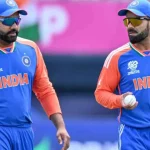 SL vs IND: Rohit Sharma, Virat Kohli to skip upcoming ODIs, Hardik Pandya or KL Rahul to lead Team India
SL vs IND: Rohit Sharma, Virat Kohli to skip upcoming ODIs, Hardik Pandya or KL Rahul to lead Team India
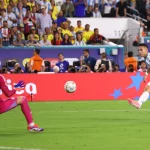 Colombia lost Copa América final but won back a nation’s hearts
Colombia lost Copa América final but won back a nation’s hearts
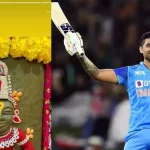 Suryakumar Yadav’s latest Instagram story sparks speculation amid T20I captaincy rumours
Suryakumar Yadav’s latest Instagram story sparks speculation amid T20I captaincy rumours
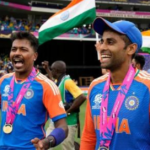 Indian players trust Suryakumar Yadav more than Hardik Pandya, BCCI got feedback. MI dressing room chaos added fuel
Indian players trust Suryakumar Yadav more than Hardik Pandya, BCCI got feedback. MI dressing room chaos added fuel
 Olympics 2024: Why football, archery and rugby have started in build-up to opening ceremony in Paris
Olympics 2024: Why football, archery and rugby have started in build-up to opening ceremony in Paris
